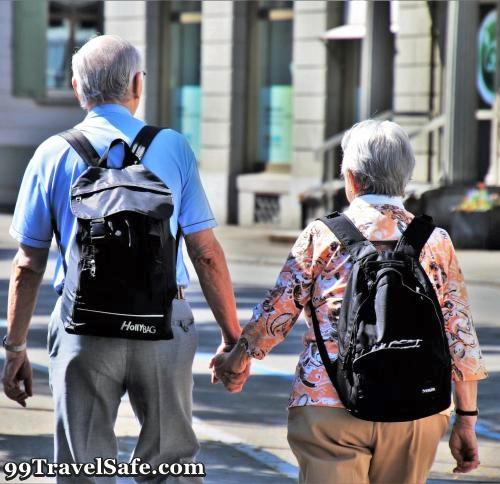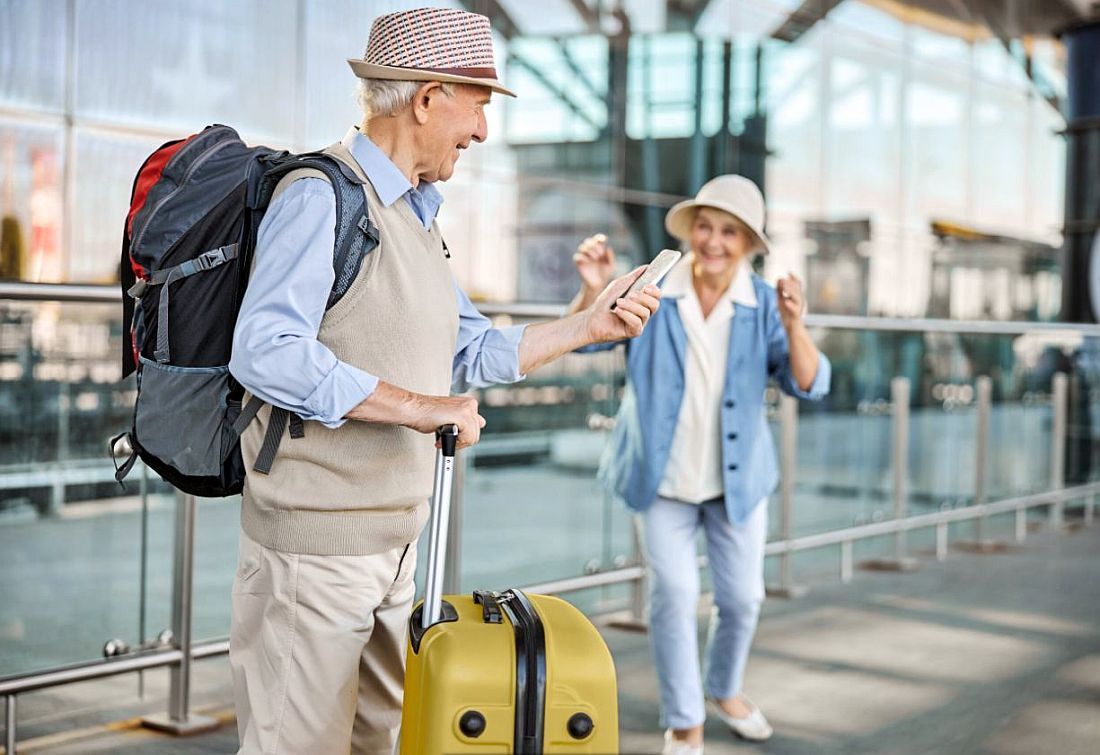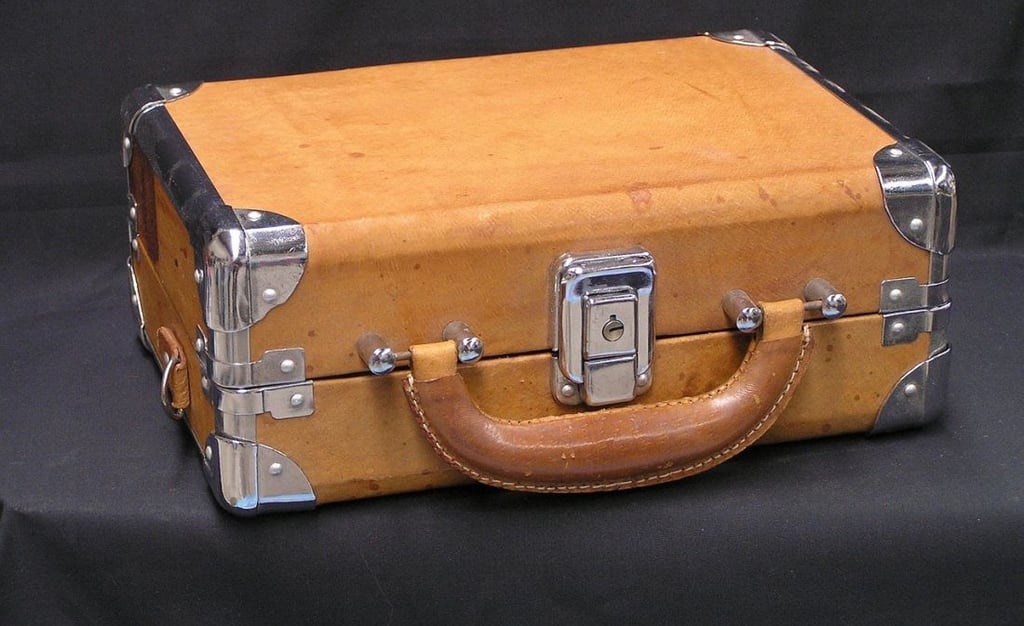

99TravelSafe.com
The Website For The Smart and Savvy Traveler
Travel Safety Tips for Senior Citizens!


Related Pages - Please Also See;
Safely Using Elevators and Escalators
48 – Travel Safety On A Cruise Ship
33 – In Case of Theft and Loss During Travel
34 – Ensuring Money or Cash Safety During Travel
35 – Ensuring Credit Card Safety During Travel
14 - Precautions While Walking On The Streets During Travel
Safety Tips for Business Travelers
If You Are Hospitalized During Travel
Travel Safety Tips For Senior Citizens!


Make an appointment with your healthcare provider or a travel health specialist at least 4-6 weeks before you go. They can help you get destination-specific vaccines, medicines, and information. Discussing your health concerns, itinerary, and planned activities with your provider allows them to give more specific advice and recommendations
Make sure to bring a copy of your official immunization records with you when you travel
Tell your doctor about
-- Any chronic medical conditions such as hypertension and asthma.
-- All destinations that you will be visiting
-- The types of accommodations where you will be staying such as hotels, hostels, short term rentals, boats, camping etc.
-- The purpose of your trip such as to visit friends and relatives, business, or adventure travel
-- Timing and length of your trip.
-- Planned activities, such as climbing at high altitudes, scuba diving, humanitarian aid work, or taking cruises
-- All medications that you are taking
-- Make sure you are up to date with all of your routine vaccines
Some routine vaccines for older adults include pneumococcal pneumonia vaccine, zoster or shingles vaccine, and an annual flu shot. Learn more about what routine vaccines are recommended for adults
Take recommended medicines as directed. If your doctor prescribes medicine for you, take the medicine as directed before, during, and after travel. Counterfeit drugs are common in some countries, so only take medicine that you bring from home and make sure to pack enough for the duration of your trip, plus extra in case of travel delays. Learn more about traveling abroad with medicine.
Keep a Paper or Electronic Record of Your Medical History With You During Travel!
Chronic Health Issues
Blood clots
Jet Lag
Motion Sickness
Cruise Ship Travel
Cruise ship travel is popular among older adults. However, cruise ships can create an ideal situation for diseases to spread. Common diseases that spread on cruise ships include norovirus, that can cause diarrhea and vomiting, and respiratory diseases like influenza and COVID-19. To help prevent getting sick, make sure to wash your hands often, especially before eating and after using the bathroom. Wash your hands before touching your eyes, nose, or mouth.
If you feel sick before your voyage, reschedule your trip. If you feel sick during your voyage, report your symptoms to the ship’s medical facility and follow their recommendations
Plan for the Unexpected!
Get travel insurance! Find out if your health insurance covers medical care abroad. Travelers are usually responsible for paying hospital and other medical expenses out of pocket at most destinations. Make sure you have a plan to get care overseas, in case you need it. Consider buying additional insurance that covers health care and emergency evacuation, especially if you will be traveling to remote areas


More on Travel Safety Tips for Senior Citizens!


Older Travelers Should;
Plan Ahead (Before Travel)
Planning is crucial for a smooth trip. Choose destinations that align with your interests and physical capabilities. Consider the accessibility of the location, availability of medical facilities, and the climate. Booking flights and accommodations in advance can also help secure better deals and preferred seating or room arrangements.
Manage Medications
Ensure you have an adequate supply of all necessary medications. Keep them in their original containers/ blister packs and carry a copy of your prescriptions. It’s also wise to have a doctor’s note for any liquid medications to avoid issues at security checkpoints.
Stay Hydrated and Eat Well
Traveling can be dehydrating, especially on long flights. Carry a refillable water bottle and drink plenty of fluids. Pack healthy snacks like nuts, fruits, and energy bars to maintain your energy levels and manage your dietary needs.
Pack Light
Packing light can make travel easier and reduce the risk of injury from lifting heavy bags. Use a rolling suitcase and a small carry-on bag for essentials. Consider using luggage delivery services to avoid carrying heavy bags through airports.
Stay Active
Long periods of sitting can increase the risk of deep vein thrombosis. Choose an aisle seat to make it easier to get up and move around. Take short walks and stretch your legs during layovers or breaks in your journey.
Use Technology Wisely
While free Wi-Fi can be convenient, it’s important to avoid accessing sensitive information on unsecured networks. Verify the legitimacy of the Wi-Fi network with staff before connecting.
Consider Travel Insurance
Travel insurance is particularly important for seniors. It can cover unexpected medical expenses, trip cancellations, and emergency evacuations. Ensure your policy includes coverage for pre-existing conditions and check if your health insurance is valid at your destination.
Hire a Travel Companion
For seniors who need extra assistance, hiring a travel companion can provide peace of mind. Companies like Right at Home South Liverpool & Halton offer services where a caregiver can accompany you on your trip, providing support with mobility, medication management, personal care and daily activities.


A Reminder To Older Travelers;


To ensure a safe and enjoyable travel experience for senior citizens, prioritize health, pack light, research destinations, secure travel insurance, and stay informed about travel details and potential risks.
Here's A More Detailed Breakdown of Travel Safety Tips for Senior Citizens
Before You Go
Consult with a Physician - Discuss any health conditions or medications and get necessary medical clearance for travel.
Gather Important Documents
Ensure passports, visas, and other necessary documents are in order and make copies for safekeeping.
Research Your Destination
Learn about the local culture, weather conditions, and potential safety concerns.
Consider Travel Insurance
Travel insurance provides a safety net for unexpected events like medical emergencies, lost luggage, or trip cancellations.
Pack Smart and Light
Pack only essentials and consider using a smaller suitcase or backpack to avoid strain.
Find Senior Discounts
Many airlines, hotels, and attractions offer discounts for senior travelers.
Choose Hotels and Accommodations Wisely!
Opt for hotels and accommodations with amenities like elevators, wheelchair access, and medical services nearby.
Plan for Travel Stress
Include rest days and consider direct routes and flights to reduce travel fatigue.
Keep Others Informed
Share your itinerary and contact information with family or friends.
During Your Trip
Stay Hydrated and Eat Well: Drink plenty of fluids and eat regular meals to maintain energy and well-being.
Manage Medications: Ensure you have enough medication and know where to get refills if needed.
Be Aware of Your Surroundings: Take extra precautions in crowded areas and be mindful of potential scams or safety risks.
Utilize Transportation Services: Consider using airport wheelchairs, accessible transportation options, and taxis instead of walking long distances.
Stay Connected: Carry a phone or other communication device and keep it charged.
Be Prepared for TSA Rules (For US travel): Familiarize yourself with TSA guidelines and allow extra time for security checks.
Stretch Your Legs: Get up and move around periodically during long flights or car rides to prevent stiffness and improve circulation.
Beware of Free Wi-Fi: Be cautious about using public Wi-Fi, as it can be vulnerable to hacking. Use VPN on public wi-fi's
Consider using luggage carts or hiring someone to help with luggage if needed!






